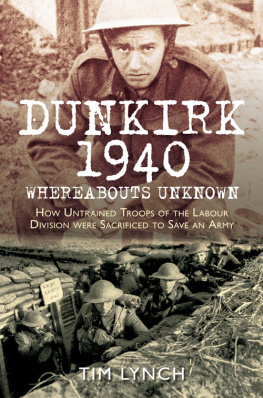
In memory of 4604110 Private Philip Smith, 9th Battalion West Yorkshire Regiment, 19031982
And the forgotten men of the battle for France.
This book began as an attempt to find out about the experiences of my grandfather in the defence of Arras in 1940. He had not spoken of it when I was a child and died a few months before I returned from the Falklands, having perhaps learned the questions I should have asked. The records of the 9th seem to have been lost in the battle and the Battalion disbanded soon after its return to England. No-one seems to have thought it necessary to record its part in the war and so far I have found only a few tantalising references, a letter on an internet auction site and a scattering of misfiled lists in other war diaries. The search, however, led me to reading of the 2/5th Battalion of the Regiment and from there to the history of 137 Brigade whose unsung experiences encapsulate all that was good and bad about the army sent to France in 1939. This book is dedicated to all those who served the lines of communication. I would like to thank Shaun Barrington of Spellmount at The History Press for recognising that this was a story worth telling.
In researching the book, I have had the pleasure of getting to know a wide variety of people whose passion for their subject and willingness to share what they know has added a depth to the story I could never have managed alone. Hugh Sebag-Montefiore was kind and courteous enough to make efforts on my behalf to track down information about the 9th. Martin Marix Evans shared his new-found details about the impact of the geography and geology of the Dunkirk area on the German attack plans.
Adrian Noble, whose father served with the Tyneside Scottish, sent me his files on the battle at Ficheux and Jeremy Moor his fathers own diary of the events around Robecq. These were subsequently to form the basis of the official account given by Major Parks in his 1941 article but included insights that were later dropped. Both added the vital element of remembering that this is not ancient history.
I owe a very great debt of gratitude to Kim James, whose own excellent book The Greater Share of Honour (Troubador Books, 2007) is a moving account of what these events meant to real people. Kims friendship is something to treasure and he has been generosity personified in sharing the fruits of his years of research, including a number of war diaries and personal accounts. It was he who produced Rex Flowers unpublished story that forms an important part of this book. It was also through Kim that it was possible to access the papers of Archibald Bentley Beauman, courtesy of his daughter, Lavender Scaramanga. Beauman deserves far greater recognition than he ever received.
Other accounts were gathered from the collections of the Imperial War Museum and the BBC WW2 Peoples War, an online archive of wartime memories contributed by members of the public and gathered by the BBC. The archive can be found at bbc.co.uk/ww2peopleswar.
Finally, as ever, my thanks go to my wife, Jacqueline and daughter Bethany for letting me get on with writing. My son, Joshua, was supportive in the way only a five-year-old can be. Had he been in France in 1940, his help for Beauman et al would have been worth another division to the Germans. All three help keep me sane by driving me mad. Thanks.
Tim Lynch
Contents
The BEF Destroyed and Rebuilt, 19191939 |
The Expansion of the Logistical Tail |
The Mobilisation of the Territorial Army, 1939 |
The Deployment of the Digging Divisions, April 1940 |
The British High Command and the Allied Plan, 1940 |
Fall Gelb, the German Invasion Plans |
Committing the Digging Divisions, May 1940 |
The Slaughter of the Innocents, 20 May |
The 2/5th Yorkshires and the Road to Dunkirk |
The Stranding of 137 Brigade, 20 May |
Losing Command and Control in Normandy, June 1940 |
The 2/6th Dukes and the Highland Division, St Valery |
Crossing the Seine, the 2/7th Dukes at Les Andelys |
The 2/4th KOYLI and the battle for Pont de LArche |
Homecomings, 19401945 |
Chapter One
A specified dimension within a
specified time
On 11 October 1939 Minister for War Leslie Hore-Belisha announced to the Commons that he was:
able to inform the House that we have fulfilled and more than fulfilled our undertaking recently given to France to dispatch to that country in the event of war a British Expeditionary Force of a specified dimension within a specified time Within six weeks of the outbreak of war in 1914, we had transported to France 148,000 men. Within five weeks of the outbreak of this war we had transported to France 158,000 men. During this period we have also created our base and lines of communication organisation so as to assure the regular flow of supplies and munitions of every kind and to receive further contingents as and when we may decide to send them.
Further, he said, 25,000 vehicles of some 50 different types, some of them of enormous dimensions and weighing 15 tons apiece or more, had been delivered via harbours with specialist equipment.
This, he said, was not the light army that had gone to France twenty-five years before:
Nearly sixty per cent of the fighting troops in 1914 were infantrymen, relying on their rifles and bayonets and two machine-guns per battalion. Now only twenty per cent of the fighting troops are infantrymen, with fifty Bren guns and twenty-two anti-tank rifles, and other weapons as well with each battalion. It will be seen from this one example how much more effectively armed with fire-power is the present Expeditionary Force.
He might have added, wrote one observer, that even in 1914 the Kaisers generals were astounded at the firepower of the British line; they could not believe that the men were armed only with rifles and not machine-guns, so rapid and accurate was their fire.
Knowing the precise situation regarding the British Field Army in France in general, and in particular in my own division, wrote Bernard Montgomery, then a Major-General in command of 3rd Division:
I was amazed to read in a newspaper one day in France in October 1939, the speech of the Secretary of State for War in Parliament when he was announcing the arrival of the BEF in France. He gave Parliament and the British people to understand that the Army we had just sent to France was equipped in the finest possible manner which could not be excelled. Our Army is as well if not better equipped than any similar Army.
In fact, Montgomery claimed, the Army was totally unfit to fight a first class war on the continent of Europe Indeed, the Regular Army was unfit to take part in a realistic exercise.
Twenty-five years on, there was much about the men arriving in France in 1939 that was familiar to the veterans of their fathers war. Despite the introduction of new battledress and webbing equipment in 1937, many men still wore the same uniforms and equipment and carried the same basic weapons as the previous generation. Crucially, though, the men arriving in 1939 differed most from those of 1914 in their ability to make use of the firepower Hore-Belisha so admired. His emphasis on the greater number of machine guns, for example, glossed over the fact that there were now only a third the number of men available to fire them. According to his statement, 60 per cent of the 1914 BEF 88,000 men had been infantry soldiers able to man positions along the front. Now, even heavily armed, only 20 per cent 31,600 were available to do the same job.
Next page














